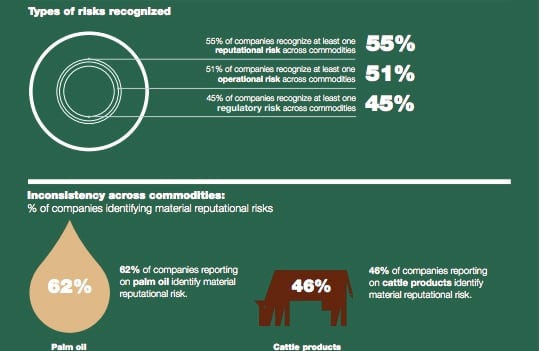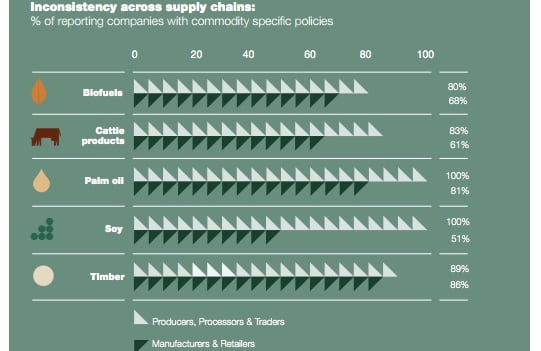Katie McCoy, head of CDP's forests programme, said: "You would be forgiven for thinking that 2014 has been the year of ‘deforestation-free supply chain’ commitments. This year has seen many large global companies make a commitment to rid their supply chains of deforestation."
"Despite the encouraging momentum on corporate commitments, we see varying levels of performance by companies on the journey and some concerning inconsistencies," she added.
The report revealed that more attention was being given to palm oil and timber than any other commodities, which could suggest companies only addressed the risks around those commodities where there was pressure from recent NGO campaigns. It also showed that action was not always taken at every stage of the supply chain.
Risks and opportunities
CDP's report suggested that companies failing to act on deforestation risked lagging behind their competitors.
"The 30% increase in the number of investor signatories demanding corporate disclosure through CDP’s forests programme shows that investors are increasingly paying heed to these issues," said the report.
“Companies that regularly respond to CDP's forests programme are now identifying many more of the opportunities available to them, including securing their supply chain against the risks associated with deforestation and commodity sourcing. This in turn is helping to secure shareholder value," added Paul Simpson, chief executive officer at CDP.

The report revealed that companies were inconsistent in recognising risks and taking actions, despite seeing opportunities in tackling deforestation.
“Companies further along the supply chain are for example less likely to recognise operational risks to their business, with only 35% of manufacturers identifying operational risks associated with soy when 83% of producers see that same risk,” said the report.

Two hundred and forty investors representing $15trn (€12trn) in assets signed the CPD’s forest programme urging companies to make deforestation-free pledges.
The report looked at disclosures from major companies around the world, such as Cargill and Unilever, which have made commitments to be accountable on deforestation. The 152 companies included in the report together represent a market capitalisation of over $3trn (€2.4trn).
“Over time, commitments to take deforestation out of supply chains for ‘forest-risk commodities’, such as timber, palm oil, cattle products, soya and paper, could have a transformative impact, supporting sustainable jobs and growth in developing countries, while meeting global demand for these commodities without destroying forests,” said Lynne Featherstone, the UK's parliamentary under-secretary of state for international development.
“Transparency and disclosure are the first tentative steps on the road to realizing this ambitious agenda,” she added.
You can find the full report here.
